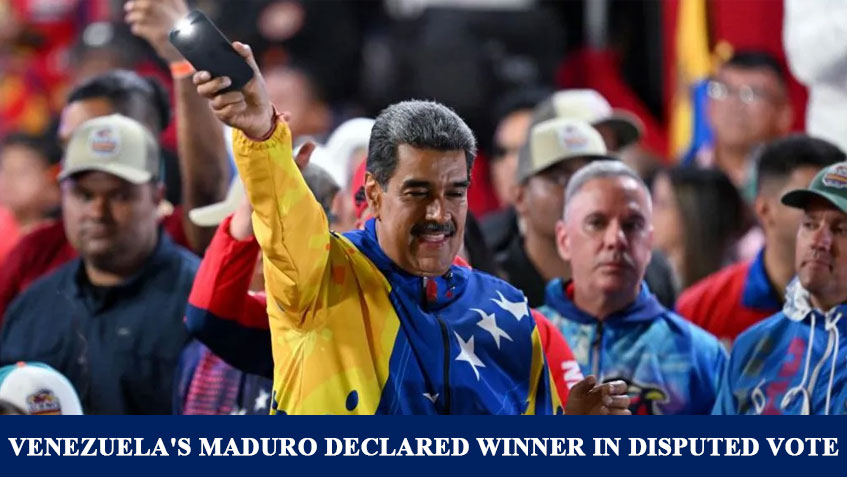Venezuela ‘s Maduro proclaimed victorious in a contentious vote
Based on the partial results released by the electoral council, President Nicolás Maduro has emerged victorious in Venezuela ‘s presidential contest.
After 80% of the votes were counted, Mr. Maduro’s close ally Elvis Amoroso, the leader of the National Electoral Council (CNE), announced that he had 51.20% of the vote, compared to 44.02% for his primary opponent.

The opposition in Venezuela has vowed to contest the outcome and has accused massive fraud in the vote-counting process.
In an effort to overthrow Mr. Maduro after 11 years in office, they banded together in support of contender Edmundo González.
Mr. Maduro declared his reelection a “triumph of peace and stability” while addressing jubilant supporters in Caracas.
He ridiculed the opposition, claiming that it “cries fraud” at every election, and applauded Venezuela’s transparent electoral process.
Following the announcement of the outcome, the US Secretary of State voiced his doubts. According to US officials, Antony Blinken, “serious concerns that the declared outcome does not reflect the will or the votes of the Venezuelan people” exist.
Cuba, a strong supporter of Mr. Maduro’s administration, declared that “the Revolution won and the people spoke.”
To publish its own vote total, the opposition sent hundreds of witnesses to vote at polling places across the nation.
But a coalition spokesman for Mr. González said that witnesses had been “forced to leave” numerous polling places.
Amid widespread suspicions that the government would try to steal the vote, the opposition had also urged supporters to maintain a vigil at voting centres to confirm the counting process in the “decisive hours” following close.
According to opinion surveys, Mr. González was far ahead of Mr. Maduro.
Many people expressed their desire for change following the socialist PSUV party’s 25-year rule, first under the late President Hugo Chávez and then under Nicolás Maduro following his death from cancer in 2013.
The PSUV has taken charge of the legislative, executive, and a large portion of the judiciary under their direction.
In the lead-up to this election, there was a general concern that the poll will likewise be plagued by anomalies, as the previous election in 2018 was highly criticised for being neither free nor fair.
President Maduro added fuel to those anxieties when he declared he would win “by hook or by crook”.
Despite this, the opposition began the election on a high note by saying that if a large number of their followers cast ballots, it would be extremely difficult for the government to “steal the election”.
Venezuela uses electronic voting. On a voting machine, voters punch in a button that corresponds to their favourite candidate.
Along with printing a paper receipt that is deposited in a voting box, the system also generates electronic results that are emailed to the CNE headquarters.
Parties are permitted by law to send witnesses to each polling station to witness the tally of these paper receipts, but many were not allowed to.
Less than one-third of the printed receipts, according to the opposition, had been made available to it.
Their strategy had been to keep an eye on these tallies to see if they agreed with the CNE’s declared results.
More News: destinydot.com
JOIN WITH US WHATSAPP CHANNEL: https://whatsapp.com/channel/0029Va4bIhd6GcGCVFJLgE2L
